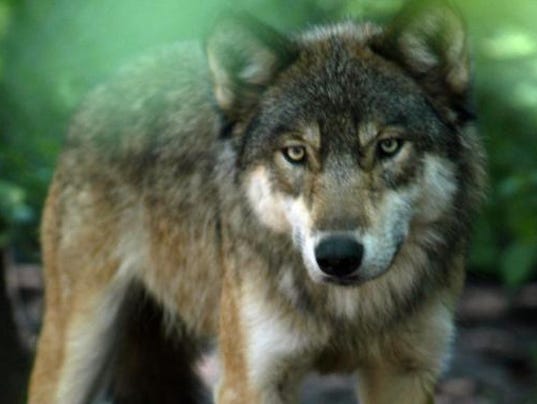(Photo: File/AP/Wisconsin DNR)
The 4th District Court of Appeals' ruling marks another chapter in the bruising political battle over the state's wolf hunt. Republicans and farmers contend that the hunt is necessary to control a burgeoning wolf population that's preying on livestock and deer; conservationists and animal lovers say the population is still fragile and that the animal is too majestic to kill.
A Republican-authored law establishing the wolf hunt permits hunters to use up to six dogs to track and trail wolves after the state's 9-day gun deer hunt ends every November, making Wisconsin the only state that allows dogs to track wolves.
The state Department of Natural Resources crafted emergency rules implementing those provisions. The rules contained just two restrictions: hunters can't use dogs at night and the dogs must be tattooed or wear an identification collar.
The humane societies and the National Wolfwatcher Coalition sued. They alleged that the DNR failed to adopt any meaningful restrictions on hunting wolves with dogs, clearing the way for bloody dog-wolf fights in the woods and violating both the wolf hunt's track-and-trail limitations and animal cruelty statues.
Dane County Judge Peter Anderson rejected those arguments last year. But he did declare DNR rules stating anyone can train dogs on wild animals without a license to be invalid as they apply to wolves. The humane societies, the DNR and dog trainers interpreted that ruling to mean people can use dogs in the hunt but can't train them on wolves.
The appellate court concluded that the lack of restrictions in the DNR's rules doesn't conflict with the wolf hunt law or animal cruelty statutes. The court said it's unclear how many restrictions the agency would have to impose to achieve compliance.
The DNR made a rational decision on the extent of restrictions, the court added. Hunters with experience with dogs tracking wolves during coyote hunts told the agency they had never seen any violent encounters and wolves typically try to outrun the dogs.
As for Anderson's ruling invalidating training, the court said Wisconsin residents have a common law right to hunt. The freedom to use dogs extends from that right, not from DNR regulations. Therefore Anderson's ruling invalidating dog training rules as they apply to wolves has no legal effect, the court found.
Jodi Habush Sinykin, an attorney for the humane societies, said she was saddened by the ruling. The decision creates more urgency to change state law to prohibit using dogs on wolves outright "so Wisconsin can be like the rest of the country and the civilized world," she said. She had no immediate comment on a possible appeal to the state Supreme Court.
An attorney for the sportsmen groups didn't immediately return messages. DNR spokesman Bill Cosh said the agency was pleased with the decision.
The agency examined 27 of the 35 wolves killed by hunters using dogs this past season. The DNR couldn't find any evidence of fights or law violations but the evaluation was inconclusive; the carcasses had been skinned when the agency examined them.
The DNR has been working on permanent rules governing dogs in wolf hunts. Agency officials have said those regulations would restrict training on wolves to daylight hours during the wolf season and the month of March and mirror the law's six-dog restriction.
The rules were supposed to be ready by the 2014 season's October start. But Cosh said agency officials couldn't get them done in time and now hope to have them in place by the 2015 season.
source


No comments:
Post a Comment